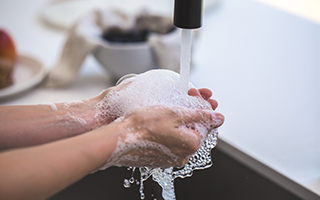 Proper handwashing is the first line of defence against infections. However, frequent handwashing can lead to dry, cracked, painful and itchy skin which may lead to an infection. This is especially true for those people suffering from skin conditions like eczema or psoriasis. Dry skin is caused by an impaired skin barrier and a deficiency in the healthy fats in the top layer of the skin.
Proper handwashing is the first line of defence against infections. However, frequent handwashing can lead to dry, cracked, painful and itchy skin which may lead to an infection. This is especially true for those people suffering from skin conditions like eczema or psoriasis. Dry skin is caused by an impaired skin barrier and a deficiency in the healthy fats in the top layer of the skin.
Here are a few tips for protecting your skin from drying out.
1. Dry your hands properly
After washing your hands it is important to dry your hands properly. Not only are germs easily transferred between wet hands, but water has a drying effect on the skin. When water evaporates it reduces the skin’s natural oils.
2. Avoid using hot water for handwashing
Make sure you use warm rather than hot water. It is also a good idea to wear latex or rubber gloves when washing the dishes, when using cleaning products or when using other cleansing and washing products, that may dry out the skin if you shampoo your child’s hair.
3. Regularly use a moisturiser
Frequent use of hand sanitisers and soaps can strip the proteins in the top layer of the skin. When this happens you may experience dryness, itching and even cracking or bleeding. Your skin might feel like its burning. Frequent moisturising helps to avoid dermatitis and heal rough hands, locking the moisture inside. You should use a moisturiser throughout the day and especially when your hands feel dry. To prevent spreading germs, it’s a good idea to carry your own personal tube of moisturiser rather than sharing a jar of it with others.
Moisturising while you sleep can also be effective. Simply apply the moisturiser in a thick layer and then put on a pair of thin cotton gloves. If you use an alcohol-based hand sanitiser, it’s important to moisturise afterwards. You can speak to your community pharmacist about moisturisers that are
suitable for your skin.
4. Emollient soap substitute
Emollient soap substitutes can be used as an alternative to soap when washing your hands, but be aware that they are not recommended as effective against COVID 19 and you should still use soap to clean your hands even if you have a skin condition. Your community pharmacist can recommend a suitable treatment for your skin. After washing your hands, rinse and make sure to pat dry rather than rub.
5. Fragrances and preservatives
Fragrances and preservatives in soaps, hand lotions, ointments and creams can dry your skin out and make it sore or itchy if you’re sensitive to them. If the product you’re using is making you uncomfortable, you can speak to your community pharmacist at Priceline Woden about suitable alternatives.


